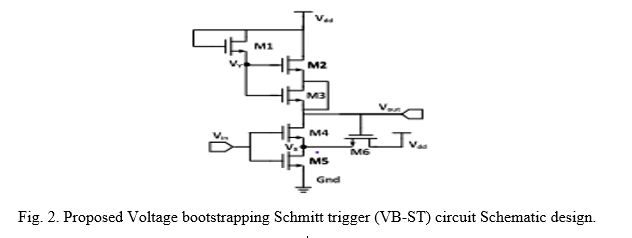BTI and Soft-Error Tolerant Voltage Bootstrapped Schmitt Trigger Circuit
Also Available Domains Transistor Logic|Cadence EDA
Objective
The main of this project is to reduce the delay and NBTI effects by using N-mos transistors in Schmitt trigger design
Abstract
In this paper, a novel BTI resilient voltage bootstrapped Schmitt trigger (VB-ST) circuit with improved noise margin, leakage power and rail-to-rail voltage is proposed. An only NMOS transistor is used in the proposed VB-ST circuit, which helps to reduce the aging effect specially Negative Bias Temperature Instability (NBTI) on the circuit. Since output voltage swing is improved noise immunity is improved. And the proposed Schmitt trigger is tolerant to the effects of radiation hardened particles. The proposed Schmitt trigger was designed using 45nm Technology file using Tanner EDA tool with a supply voltage of 0.4V
NOTE: Without the concern of our team, please don't submit to the college. This Abstract varies based on student requirements.
Block Diagram

Specifications
Software Requirements:
- Tanner EDA
- Technology files:45nm
Hardware Requirements:
- Microsoft® Windows XP
- Intel® Pentium® 4 processor or Pentium 4 equivalent with SSE support
- 512 MB RAM
- 100 MB of available disk space
Learning Outcomes
- Introduction to Schmitt triggers
- Transistors & its applications
- Types of Transistors
- Logic Gates using Transistors
- Pull Up and Pull Down networks
- Importance of Transistors
- MOS Fundamentals
- NMOS/PMOS/CMOS Technologies
- How to design circuits using Transistor logic?
- Transistor level design for Schmitt trigger
- How to design low power, high speed area efficient transistor level circuits?
- Drawbacks in CMOS technology
- Scope of Schmitt trigger in today’s world
- Applications in real time
- Tanner EDA tool for design and simulation
- Solution providing for real time problems
- Project Development Skills:
- Problem Analysis Skills
- Problem Solving Skills
- Logical Skills
- Designing Skills
- Testing Skills
- Debugging Skills
- Presentation skills
- Thesis Writing Skills


 Paper Publishing
Paper Publishing
